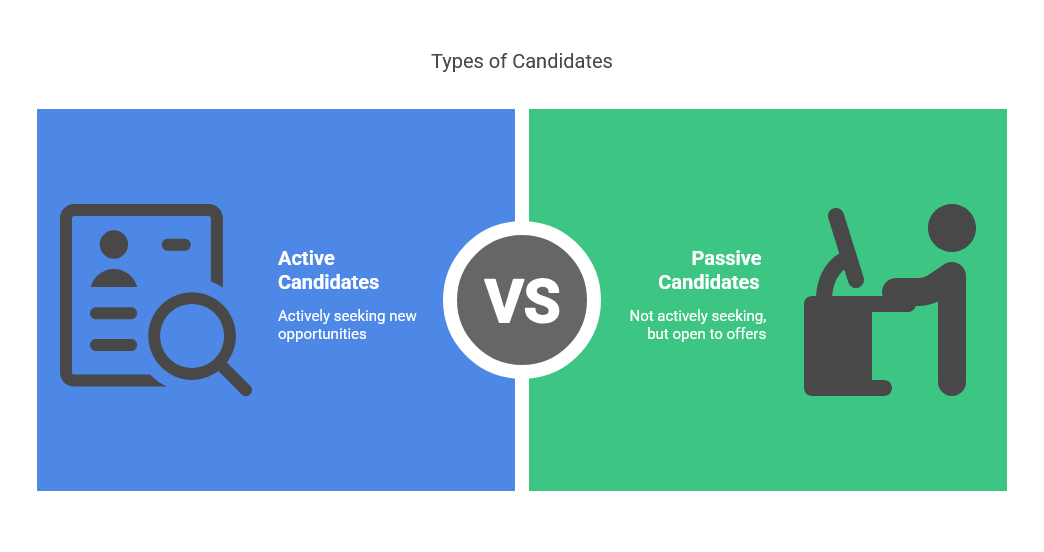Don’t have the time to read?Listen here instead or save to your Spotify playlist. |
You’ve posted the job. You’ve reviewed the resumes. Still not finding the right fit? That’s because your ideal hire might not be looking at all. Those are what we call passive candidates.
“Most hiring teams know how to handle active candidates. But when that pool runs dry, it’s time to level up your strategy,” said Ruffy Galang, CEO and Co-Founder of Remote Employee®.
“Plus, going after passive candidates costs more than you think, between money and manpower. And the average time to fill a position takes up to 44 days. You have more hiring options than you think.”
In this blog post, we cover:
Other ways you can get quality employees
- What passive candidates are
- What are the differences between active vs. passive candidates
- How you could be sourcing passive candidates
- What it really costs to chase passive candidates
What Are Passive Candidates?
They’re not chasing job ads. They’re not tweaking resumes. Just what is a passive candidate in recruitment? Passive candidates are professionals who aren’t actively looking, but who may be open to opportunities when the right one comes along.
These are seasoned pros already doing the job somewhere else. They’re skilled, steady, and not sending out applications—but that doesn’t mean they’re off-limits. The proper role, pitch, or growth path could spark their interest.
70% of the global workforce are passive candidates. Top performers often fall into this group. They’re paid well, treated right, and staying put—for now. But that doesn’t mean they aren’t curious. Many would consider a move if it meant a step up, a better fit, or a chance to sharpen their edge.
What is the Difference Between Active vs. Passive Candidates?
Active candidates are job hunting. They’re scanning job boards, sending resumes, and ready to make a move. Some want more growth. Others need stability. Maybe their company downsized. Perhaps they’re just prepared for what’s next.
These folks are easy to find, but that comes with noise. More applicants mean more resumes to filter, and not all of them hit the mark.
Passive candidates? They’re not looking. They’re working. They have solid roles, good pay, and no urgent reason to switch. But that doesn’t mean they’re closed off. The right pitch can catch their eye.

How You Could Be Sourcing Passive Candidates
Passive candidates aren’t knocking. So you need to knock smarter. Here’s how to identify gaps in your hiring and how to engage passive candidates.
1. Start with a Gap Check
Before you chase people, know exactly who you need. Pinpoint current skill shortages and forecast what’s coming next. What roles will grow? What tech will you adopt? Nail this, and you won’t waste time chasing the wrong profiles.
2. Go Where They Are
Don’t wait for job boards to deliver magically. Hit up professional groups. Join forums. Attend niche industry events—online or in person. Whether it’s the Data Science Association or a GitHub repo, passive pros hang where the action is.
3. Work the Network
Turn your people into scouts. A strong employee referral program can crack into tight-knit talent pools faster than any job ad. Layer in LinkedIn posts, shared wins, and employee shoutouts to make your brand travel farther.
4. Boost Your Social Signals
Your social pages should sell your culture. Drop industry insights, team wins, and client success stories. Make your workplace look like somewhere people want to be—even if they’re not looking yet.
5. Make It Mobile
If your job listings look like a mess on a phone, fix it fast. Today’s pros scroll, skim, and swipe. Mobile-optimized job pages, quick-apply forms, and instant chat tools matter more than ever.
Stop Chasing Passive Candidates. Start Scaling Smarter.
Connect with pre-vetted, high-performing offshore professionals. Skip the hiring grind and build your team faster
What it Really Costs to Chase Passive Candidates
The average cost to hire in the U.S. is around $4,700. Reaching passive candidates isn’t cheap. If you’re not tracking the hours, tools, and touchpoints, that investment gets expensive fast.
1. Time Sinks
First, you spend hours researching. Then, more hours crafting custom messages. Then weeks of following up—because passive talent doesn’t move fast.
2. Outreach Overload
Hyper-personalized messages take effort. You’ve got to scan profiles, dig into work history, tailor each pitch, and deliver it in a way that actually stands out. Why? Because top-tier candidates get hit with generic pitches every day. If yours blends in, it’s dead on arrival.
3. Relationship Management
Passive candidates don’t just jump. You have to nurture. That means multiple touchpoints, updates, and conversations that don’t always lead to a hire, yet still cost you time and focus. And if you’re not tracking those interactions, you’re wasting momentum.
4. Hidden Burn
Every message you send that goes unanswered. Every hour you spend building a talent pipeline that never closes. Every perfect-fit candidate who ghosts you halfway through. It all adds up—in lost time, wasted budget, and delayed business goals.
But you have more hiring options than you think.
| Learn more about how offshore staffing can help you hire: |
Here’s How You Can Get Quality Employees Without Wasting Time Targeting Passive Candidates
Let’s be real—courting passive candidates is a grind. You’re spending weeks pitching, persuading, and praying for a maybe. Meanwhile, the work keeps stacking up and there’s no guarantee those candidates will make the move.
There’s a more imaginative play.
An offshore staffing firm like Remote Employee® gives you access to a pool of skilled, vetted talent who will work from our state-of-the-art managed offices in the Philippines. These professionals are fully integrated into your team, trained, experienced, and ready to go when you are.
Need IT support? Covered.
Accounting? No problem.
Customer service, data entry, collections? Done.
Why waste time chasing people who aren’t looking, when offshore staffing firms like Remote Employee® give you talent that’s already in play?
1. Skip the Resume Roulette
Tired of filtering through piles of unqualified applications from active job seekers? Remote Employee® helps you go straight to candidates who’ve already proven they can deliver. You hand-pick from a shortlist of professionals in roles like accounting, IT, customer service, and data entry—without the guesswork.
2. Speed Without Compromise
Passive hiring takes time. Sourcing. Interviewing. Convincing. Meanwhile, your work piles up. Remote Employee® cuts that timeline. You plug skilled offshore staff into your current workflows—your tools, your methods, your SOPs—without skipping a beat.
3. Lower Risk, Higher Retention
Passive candidates are usually stable in their current roles. You need to offer something better to pull them away. Remote Employee® flips the script: you get seasoned professionals who stick around.
4. Cost Control That Doesn’t Cut Corners
Chasing passive talent is expensive. Job ads, recruiter fees, counter-offers—it adds up fast. With Remote Employee®, you get skilled fully trained offshore employees at up to 70% lower labor costs. No surprise benefits, no relocation packages. Just results.
Ready to Stop Chasing Passive Candidates and Start Scaling?
You don’t have to keep burning hours chasing candidates who aren’t even on the market. You don’t need to stretch your employees thin trying to build relationships that may never close. And you definitely don’t need to sacrifice quality just to fill a seat.
Remote Employee® gives you direct access to skilled talent—experienced professionals who are already vetted, already trained, and already delivering for companies like yours.
Contact us today to get started.










